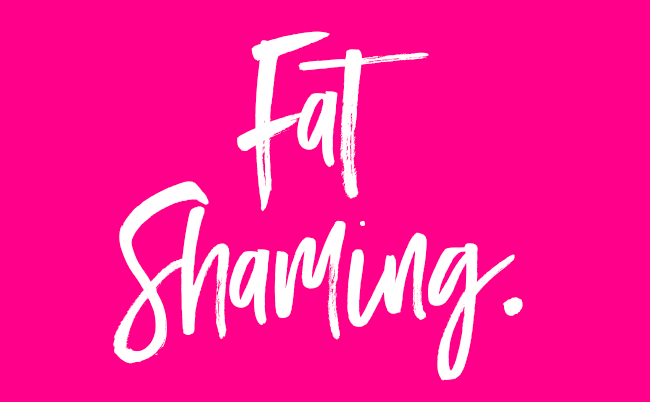 It is with great sadness that I recall a strategy I used on more than one occasion to help ‘inspire’ myself to get some weight off.
It is with great sadness that I recall a strategy I used on more than one occasion to help ‘inspire’ myself to get some weight off.
I would tack a photograph of myself on the fridge at whatever the present ‘undesirable’ weight happened to be. That way, whenever I went to get something to eat, I could count on being reminded (reprimanded?) that hey, after all, you don’t really need to eat Lani because you’ve got plenty of extra fuel riding around with you on your waist.
This fundamental energy behind this strategy is shame. Fat shaming. I recall even telling myself that I could just look at the picture and tell myself – out loud – that I had enough fat on my body and could easily stay hungry longer. I recall implementing this fat-shaming strategy during a period of fasts where I would go two or three days eating only apples, in the hopes of burning some poundage off.
A similar tactic I tried was one purveyed in weight loss articles, positive-thinking venues, and among vision board vigilantes. It went like this. Find a photo in a magazine of your body ideal – the figure you’d really like to have – and post it prominently. Keep looking at it to remind yourself of your goals. (And how far you are from them.) The result of this strategy is that every time I saw my body as it was, the contrast between the ‘ideal’ and the ‘real’ inspired so much shame that my mood would spiral downward and before long I’d be taking refuge from the pain in another batch of cookie dough.
Hitting Fat Shaming Bottom
None of these hair-brained schemes ever resulted in lasting weight loss for me. They were quite successful at increasing my fat shame and degree of body dysmorphia. It simply made me feel less than enough and bad about myself. Yet it also let me to hitting bottom – with the whole fat shaming attitude that is. Fat shaming creates unhappy hearts and does nothing to help us find our naturally healthy weight. In retrospect, in each of these scenarios, now long long ago, I wasn’t even dealing with that much poundage. Actually, I was probably close to my body’s naturally healthy weight, which I kept fighting in some hair-brained attempt at the perfect body. Dire dieting resulted in weight gain. And my weight kept spiraling upward.
All of this recently came to mind when my friend Marla Rose of Veganstreet published an article at VegNews Magazine, 6 Things to Know about Fat Shaming Among Vegans. Marla’s article starts like this:
While so much about veganism has gotten easier since when I first went vegan back in 1995—hello, we can have good cheese again!—with the advent of social media and an increased attention on appearance, we now have a pervasive and often pernicious fat shaming culture to navigate. Fat shaming—words or actions that bully, demean and/or discriminate against those considered “overweight”—is commonplace today, but what makes it unique in the vegan sphere is the messaging that if you’re not Instagram-fabulous in your bikini or workout selfies, you are not only harming your own body, you are actually doing a disservice to the animals by being a poor role model. The take-away is that unless your body aligns with a particular image of fitness and slimness, you should just keep your veganism to yourself. If you think this is an exaggeration, try to keep your eyes open: this mentality is widespread. When it comes to fat shaming among vegans, here are some things to know. (You can read Marla’s entire article here, then come back for my reflections below.)
My Response to Marla’s Article About Fat Shaming
Marla Rose, thank you for this and perfect timing as this has become hot topic in my thoughts and conversations lately in a big way. There are so many considerations here, most of which you have touched upon.
I’d like to add that our size prejudice is just that, advanced by the diet industry. Given that not everyone is genetically programmed to be ‘thin’, it breaks my heart when I see ‘thin’ equated with ‘happy’ – whether in language or inference – because they are not equivalent, for so many reasons. One, thin people are not necessarily “happy”, even though we are sold a million things – diet plans, books, clothing, supplements, etc etc – by being convinced that they are.
These seemingly innocent and ‘helpful’ campaigns carry a deep layer of hurt and harm. They hook our vestiges of bad feelings about ourselves, insufficiency, shame – by pinning it on the weight. If we could only lose the fat, we’ll be happy and free! Nuh-uh. Take it from someone who dieted and yo-yo weight -lossed for years. During ‘thin’ periods, it created some measure of happiness but it didn’t make me happy and always carried the baggage of fear. And it didn’t address the real issue that is making us unhappy about our bodies in the first place, that is NOT ‘fixed’ by losing the weight.
It was only when I gave up dieting, a fantasy weight, and pinning so much on how my body was measuring up that day that real happiness – independent of ‘weight’ – had a chance to emerge. It’s always there within us, obscured by self-judgement and criticism, and easily – as noted before – hooked by the diet industry, even in the vegan world.
Background Noise
Big marketed weight loss programs, before-after stories, fear-based regimented diets, and body perfection have become a bit like background noise for me now. They obscure the deeper issues – how we are to others, ourselves, our contribution and caring and compassion, our loving kindness and patience to ourselves. Our stress and fears and shame are so easily hooked, and pinned on body shape and size.
It always breaks my heart (did I already say that?) when a vegan comes to me, feeling shamed about their weight, that they aren’t a ‘good’ role model for other vegans, even though they may (and often have) just spent the previous weeks up to their elbows in animal welfare advocacy, or caring for some aspect of their community, or giving lectures about how to eat plant-based. It is up to all of us to take a stand and stop underscoring the value of being ‘thin and fit’. I have to keep reminding people that our bodies have a weight that is naturally defended, within a certain range, too. This can be dramatically impacted with healthful eating and physical activity, but only to a certain point. This is another topic, but not really – it’s all bound together with love, care, and acceptance for all – including ourselves – while we get on with it. Peace, ease, and happiness to all, first and foremost.
What Breaks The Cycle?
I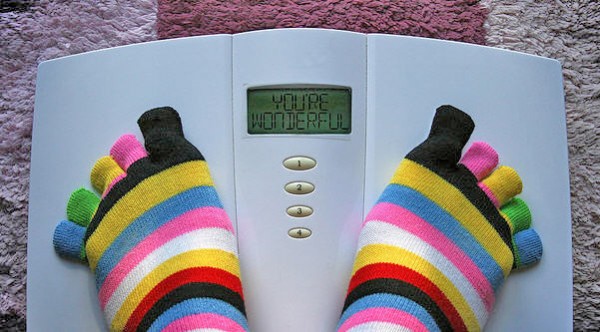 t wasn’t until I started a mindfulness practice that I realized how much pain I was causing myself through fat shaming. And that trying to shame the pounds off only leads to shame, bad feelings, and no recourse but trying to find a way to escape the pain of it all. It wasn’t until I started a mindfulness practice that I was able to give up dieting and focus on building a healthy, happy relationship with food, eating, and my body. It wasn’t until I started a mindfulness practice that I realized in my heart of hearts that compassion, accepting and loving myself and my body exactly as I am would be key to freedom around food and a fifty pound weight loss, give or take, that has sustained for nearly twenty years. (Can you see why I am so eager to get The Mindful Vegan off the press and into your hands? Patience…)
t wasn’t until I started a mindfulness practice that I realized how much pain I was causing myself through fat shaming. And that trying to shame the pounds off only leads to shame, bad feelings, and no recourse but trying to find a way to escape the pain of it all. It wasn’t until I started a mindfulness practice that I was able to give up dieting and focus on building a healthy, happy relationship with food, eating, and my body. It wasn’t until I started a mindfulness practice that I realized in my heart of hearts that compassion, accepting and loving myself and my body exactly as I am would be key to freedom around food and a fifty pound weight loss, give or take, that has sustained for nearly twenty years. (Can you see why I am so eager to get The Mindful Vegan off the press and into your hands? Patience…)
In retrospect I was both fat shaming victim and perpetrator. I was victim of the body ideal advanced in the media and my own buying into it and perpetrating it upon myself.
Today, I think about other ways that I may in some fashion perpetuate fat shaming without really knowing it. For example, in my presentations and here in my web site, I share my success at a sizable weight loss that has stuck with me for two decades. Yet recently at a presentation, when showing a ‘before’ picture, a woman in the crowd said – almost sarcastically – said “you didn’t have a weight problem.” Even though in the photograph I was carrying almost 40 lbs more than I do today, relative to her own weight challenges, I didn’t have a weight problem. I was immediately hit with the pain in her voice. Was I perpetuating fat shaming by sharing a ‘before’ that was painful to me, that might be someone else’s “if only I could have that kind of weight problem.” See what I’m saying?
Let Me Hear From You
I am very interested in hearing your response to this topic. Specifically:
- have you ever been victim of fat shaming? How has it affected you, or someone you care about?
- what are your thoughts about the photos I share about my own weight loss – do they inspire shame or hope?
Please share your thoughts in comments below.
Love and light,
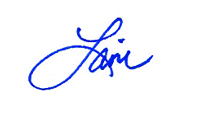
P.S. In April, I will be leading a mini-retreat all about transition to plant-based, vegan living. We’ll together study The Plant-Based Journey, I’ll lead some Restorative Yoga, and you’ll get a sneak peak into The Mindful Vegan, and of course great vegan food, and a chance to cozy up with the critters!.  The retreat will be held April 7 – 9, and is a benefit for The Animal Place animal sanctuary in Grass Valley, California. More on facebook here, and if you aren’t on facebook All the information and registration here:
The retreat will be held April 7 – 9, and is a benefit for The Animal Place animal sanctuary in Grass Valley, California. More on facebook here, and if you aren’t on facebook All the information and registration here:
http://animalplace.org/animal-places-guest-house/
https://animalplace.checkfront.com/reserve/: Simply click on the ‘weekend retreat’ tab and scroll to the event.

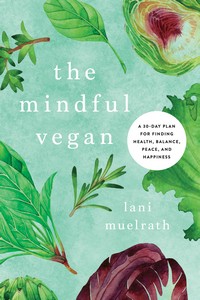
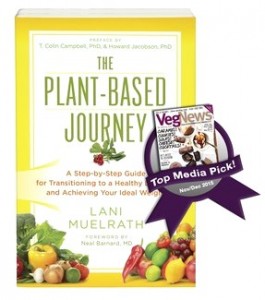
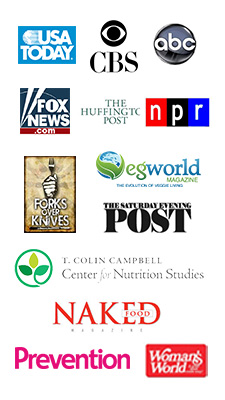
Thank you so much, Lani, the sharing of the article but mainly for keeping this important conversation going. Just as you can’t hate yourself into a more loving mentality about who you are, an abusive tone of shame and self-loathing will do nothing to shift weight loss or body image. Moreover, so much of the conversation around weight loss is full of myths and misogyny. How about this? How about we love and appreciate ourselves without condition and see what happens from there? Again, I so appreciate your voice and your insights! Thank you for your example of kindness and generosity.
Marla, thanks to you as well for being outspoked about this and inspiring my post. I’ve been thinking about this for a long time, but your writing was what pushed me to get it down on ‘paper’ and also gave me something to sink my teeth into in response.
And the myths and misogny are a whole add-on topic! This comes to mind – a photo of four beautiful vegan women was posted and a responder said something about “look at these four vegan babes” – are we still using ‘babes’? Heavens! Can of worms!
xoxo Lani
As someone who follows a lot of wfpb sites it has gotten a little unnerving to be constantly presented with people who have lost hundreds of pounds and cured all kinds of health issues. I don’t have 100 pounds to lose, but I would feel more comfortable with a few less. I don’t have any severe medical conditions, but I have some crazy joint pain that I haven’t been able to shake off. Which also raises the guilt I feel about exercise. I gave up running due to the joint pain and so every time I hear how we should all be running, I feel inadequate. There are so many ways to feel less as a vegan. I haven’t been to any protests or volunteered at a sanctuary. It’s crazy because you feel judged by non-vegans for being vegan and judged by vegans for not being vegan enough!
Susan,
Thank you for your insightful post. I understand the unnerving. I noted that it’s become a bit like background noise. Not to diminish the angst of lots of extra weight and those who desire to lose it, or other issues such as you mention. But I can see how it does make one feel a bit left out and exhausted from the quest.
As for the rest, in my experience our not-good-enoughness is simply going to latch itself onto the nearest thing and keep the shame machine going. Trying to unburden ourselves from the weight of it item-by-item doesn’t work. It takes a healing that comes as we discover, each day more deeply, our true worthiness and good nature, which we can find by navigating the uncomfortable feelings and disquieting states.
We are all enough. Holding ourselves to a standard of perfection, or comparing what we are or are not doing relative to another is full of error. We never really know what another person is experiencing. Uncovering our own innate kindness and compassion for our daily life and those around us is the bigger project.
So sorry about the running! Is there another exercise you have found as replacement?
Thanks again for sharing,
Thinking of you,
Lani
Thanks, Lani! I am working on my not-good-enoughness. It seems to go back a long way. I’m doing yoga, using stretch bands and walking. Looking forward to your new book!
Susan,
You are so right- these things do go back a long way, and may actually have nothing to do with our bodies – it may be just the frame we are hanging not-good-enough on today. Your positive actions are right on track, being kindly attentive to the body and movement is huge for well-being. The more connectivity we have with our bodies, the better we can navigate unsettling mood states, drop spiraling negative thought, and be more the person who is the change we want to see in the world. Thank so much for sharing your thoughts.
Susan- I feel the same. I am 58 years old & for most of my life an Omnivore. I have “woken up” to healthy & compassionate eating & though of course I wish I’d done so years earlier, I am grateful that I have. I’m doing the best I can & appreciate support where it comes from. Lani is wonderful at this I think. My goal is to be compassionate to ALL beings.
You know what will help you stop feeling pain and shame better than anything else, and real fast at that? Stop being so self-centered and focus on the real victims instead. You want to feel valuable as a person regardless of your looks? Then do something valuable! There is slaughter, torture, extinction and destruction of natural habitats going on to an unimaginable extent. If that doesn’t give you a sense of proportion, then what the hell ever will?! Trust me, you will feel much better about yourself if you stop the navel-gazing…
It’s a topic that’s been beaten to death, and actually works both ways. But, it’s over the top insanity to see a woman go by a picture of a slim woman and scream fat shaming. Overweight is unhealthy, as you’ve never seen an obese 90 year old. But how one handles it is more the issue.
Robert,
Have you ever been criticized, overtly or covertly, for your size or shape? For those who have, discounting their experience doesn’t change it. And of course we have to take responsibility for our reaction to imagery that is unsettling, such as you describe. But that’s not the point, and is out of direct reach of my article. As I show in my examples, the shame factor as a way to change ourselves or ‘shape up’ is doomed.It must come from a place of kindness and, as you note, getting healthier. And many people see themselves as fat who aren’t, yet still pile on the shame. And I don’t think it’s been beaten to death, or it wouldn’t be so alive.
Nicole,
Exactly. Generosity, compassion and taking a stand for those who don’t have the voice is mindfulness in action. When we demonstrate these qualities in something bigger than ourselves, this is where real change and peace for all manifest.
I am not sure what you mean by the navel-gazing, or how the comment fits in, as it is not mentioned nor a part of my article. I may be wrong, but it seems like a sarcastic dig on mindfulness, which is so demonstrates a need to communicate better understanding of mindfulness as it applies to conscious living. Mindful living as I teach and practice has to do with unobscuring the natural qualities of generosity, compassion, and kindness that we can multiply in the lives of others through purposeful action. We become much better equipped to do this with clarity, equanimity, and vitality when we undertake practices that keep us from being self-absorbed and caught up in negative states. You become a better advocate and activist when grounded in the qualities of loving kindness.
Nicole, I think that is the point here of the article – moving beyond self-centeredness to self-awareness that gets us out of our own way so we can be of better service not only to ourselves but all the beings around us. Maybe because I practice mindfulness and it has done all those things for me, I see it as far from ‘navel-gazing’ as one can get – a comment that does not demonstrate an understanding of mindfulness practice in its true sense, but more a pop-culture interpretation.
When I was 18 years old & definitely not overweight even an ounce, one day while wearing a bikini (I was 5’7″ & weighed 120 pounds) while poolside, the guy I was dating made a remark about my “little tummy”. Now, if I had a tummy at all I must have just eaten! But I was so wounded by this, and the crazy thing is I think he must have been teasing me because for heavens sake I was a stick! This led me to go on a severe diet where I ate virtually no carbohydrates (this was the late 70’s) & not only did I lose 12 pounds in less than two weeks, I also started passing out (it actually took me awhile to see the correlation!) So I do not see this as this guy fat shaming me so much as me fat shaming myself. Although I like to see people lose weight and be healthier, I don’t care if they have six pack abs, it is more inspiring to me to hear their stories more than the dramatic photos.
Tina,
Isn’t it confounding, how one little incident – that can stick out so clearly in our minds – can have such far reach? Yikes.
And you are right, our shaming is something we do to ourselves and our ‘boyfriends’ can be the avenues. But that does not dismiss our volition at taking a stand against cruel comments. Of course your boyfriend may not even have been aware has commentary was cruel – he may well have just been ‘teasing’ – but this is our opportunity on two fronts. One, to see how we are mired in our own self-criticism and will easily hook into in when it presents in any fashion, bodies just seem to be an easy pathway, and two: to speak out with clarity about injustices. Wouldn’t it be great if you had the presence of mind to see the internal response and note it, navigate the discomfort, and with equanimity be able to tell your boyfriend that whether he was aware of it or not, the comment felt very hurtful to you? Mindfulness is about moving from automaticity to clarity and being able to take action in skillful ways.
I do go on! Forgive me, but I couldn’t pass on the opportunity to explore the mini lesson and I appreciate you for bringing the opportunity! And I’m with you, story is more than photos. I am always looking for the real change, not just the one that shows up in body shape because as we know that can parade even if unsustainable. Know what I mean?
Tina and Lani, thank you for this. Tina for telling this story, and Lani for your insights into it. I for one love the mini lesson!
Can’t wait for your book to come out.
Hi Lani! I have been at this plant based eating thing for several years now (you have helped me a lot), and, with my husband, we are trying to change the eating culture at work (we work in an elementary school) by running some jump start programs. My husband lost 60 pounds and is at his ideal weight, and I have lost 35 pounds but still have 20 pounds to go. I have all the knowledge and certifications (I took the eCornell certification course and also am a CHIP facilitator) but because I still have weight to lose, I let my husband do most of the presentations because I still feel that I am not ‘walking the talk’ and don’t look thin like a ‘real’ plant based eater looks. I am trying to overcome that and will be standing up in front of the group during our next challenge in 2 weeks, but I am still feeling shame that I don’t look like I have been doing this eating thing ‘right’ because the weight loss has been slow for me (I am 53, peri-menopausal without a thyroid). I certainly look healthy and much better than I did 3 years ago, but I just don’t feel like the poster child for WFPBNO eating. I am working on my own body image and trying to be kinder to myself and hope that because I don’t look ‘perfect’ that will make me more approachable for others in our challenge group to ask questions. Thanks for all the work that you do!
Shari,
Thank you so so much for sharing your thoughts, you bring up so many important issues it’s hard to know where to start!
First, I am so pleased for you and your husband for the changes you have made for yourselves. And right in the basket with that, you have been proactive in bringing positive message to others via the schools and the CHIP programs. Spectacular.
As for your own diminishment because of the ‘looking like a real plant-based eater’, this brings up some questions such as, well, what does that look like anyway? I know a lot of plant-based people and their bodies vary just like other humans. They tend to be overall lighter and leaner, but not at all should we think that all wfpb eaters look like the vegan sylphs (as I sometimes refer!). I certainly am not in the sylph category – the feather weights – though I certainly aspired to be for a long time. Creating that scenario for ourselves is not based on truth of the human body and does no one any good, and serves as an obstacle for your expression. The problem is, I know you know that, but what to do?
Specifically, even as you have rationalized that you ‘shouldn’t’ feel like this, and you still carry shame over your size (sorry to be blunt, but that’s how you describe it), first, can you spend a few moments sitting quietly and putting your attention on what that feels like in your body? A tightness in your chest, a lump in your stomack – however shame shows up. Just watch the sensations, and every time your mind gets lost in the story of why you should this, why you shouldn’t that, and what if they think XYZ, bring your attention back from the story to the actual physical sensations you are experiencing in the present moment. This is a simple mindful investigation of present experience. Now, once you have found the ‘feeling’ in your body, and even possibly identified it as shame (or fear, or whatever you call it) this is great progress as you have identified that this emotion is something that you can see as an object, something with a life of its own, but with which you can actually not identify with. It doesn’t mean you push it away or bury it – you dive right into the feeling in your body itself. What will happen is that you will learn you can be present with that feeling, and there is no need to run from it, but that it will eventually change, perhaps even disappear until a thought brings it up again. YOu can navigate these feelings in this way so that you are fully present with them, but don’t keep reactivity to negative thoughts alive because you tend to them mindfully. OK, remember I’ve just written a complete book about all of this so that was a tiny nutshell of helpful strategy.
Beyond that – you indicate health considerations and body passages – thyroid, peri-meno – and these all affect so much about our bodies. Diet history makes a difference, too – if we have a long history of weight up and down, controlling and managing our food so that we chronically cut back, etc etc – all these can have the affect of driving our set weight up. Many women diet more fiercely when it comes to peri or meno weight because they are afraid of the gain, but it always backfires. And I have no idea what your food and eating look like anyway, and that’s another issue, along with stress management and physical activity.
I do go on! But most of all, I want to say this. Get up there in two weeks and share your story. If you have a ‘before’ picture you can share that about your journey, too – perhaps it will alleviate some of your fears of judgement – and it will inspire others. We all like to hear stories in progress, and each of us is one of them. Remember you can never tell what is really going on with someone from seeing their body. I know some wfpb women who are uber-sylph but I also know they suffer behind the scenes with body dysmorphic disorder and/or obsessive-compulsive food plans. What wants that? We are looking for health, happiness, peace, equanimity, ‘control’ that comes from being consciously present – isn’t that right?
I hope looking at this bigger picture is helpful. And be sure to report in in two weeks – even send me an email – I want to hear you did it!
love to you,
Lani
My fat shaming began way back in 3rd grade and I carried it with me through school being called “Porky Pig” and other names, being told I was too fat in 10th grade when I was trying out for a majorette and I was 130. Needless to say I gained because I did not think I was good enough to care. It continued into my life as a parent when my daughter said to let it go.I still had the thoughts in my head but tried very hard to not have her learn that. Until I became vegan in April 2010 that was my life. Being plant-based has been my God-send. I no longer stress over my weight but tried to use my lessons to help others not allow the fat-shaming to be their life as I had.